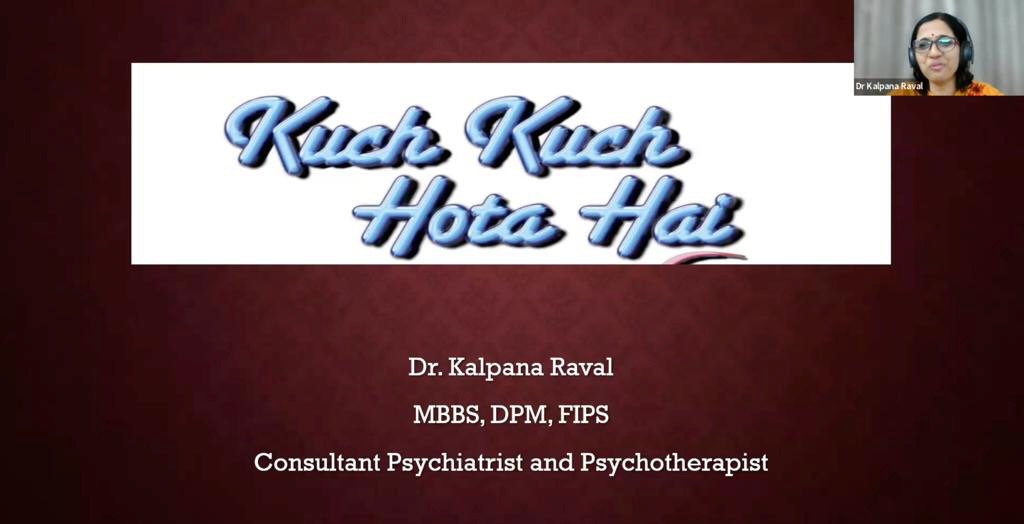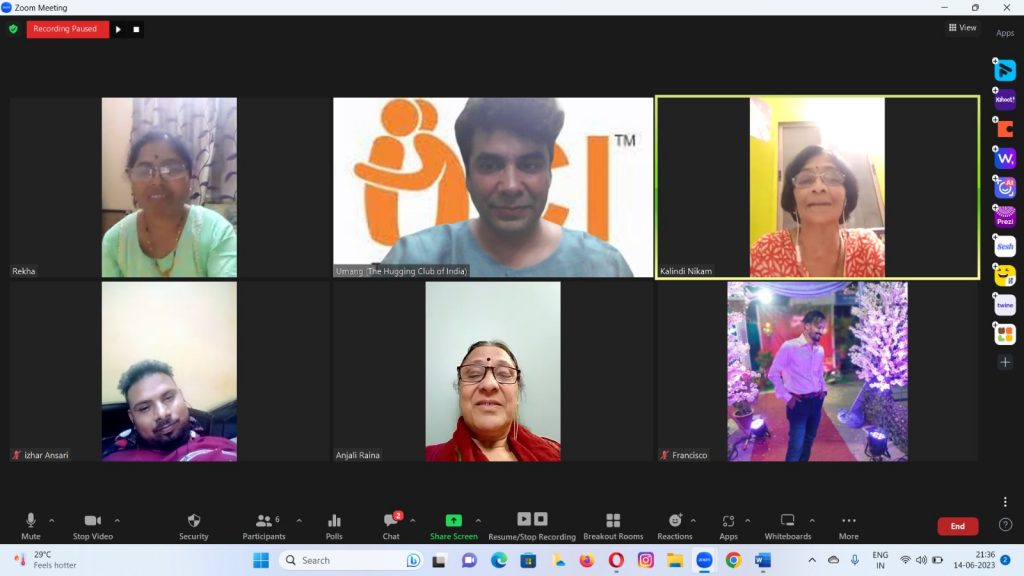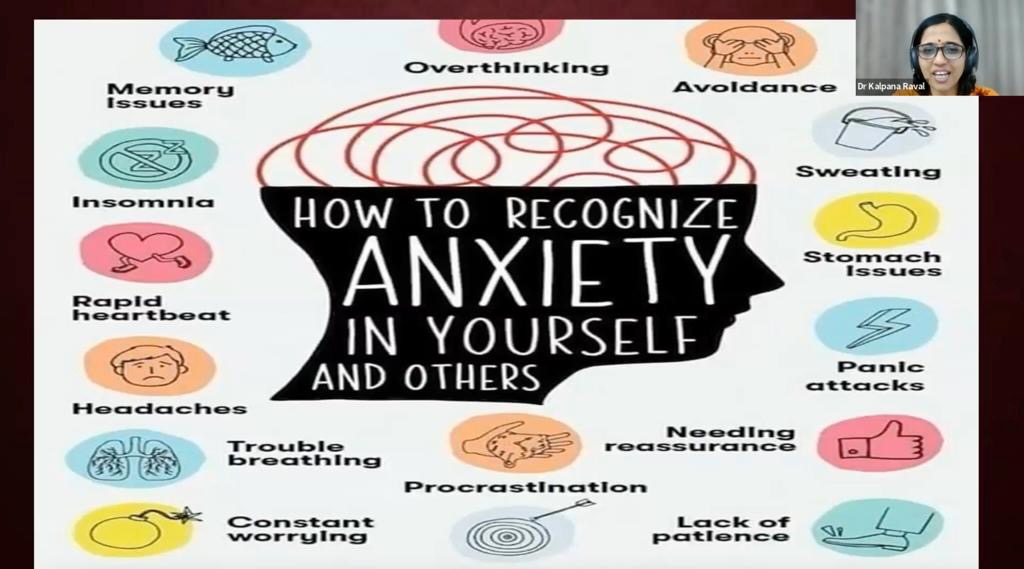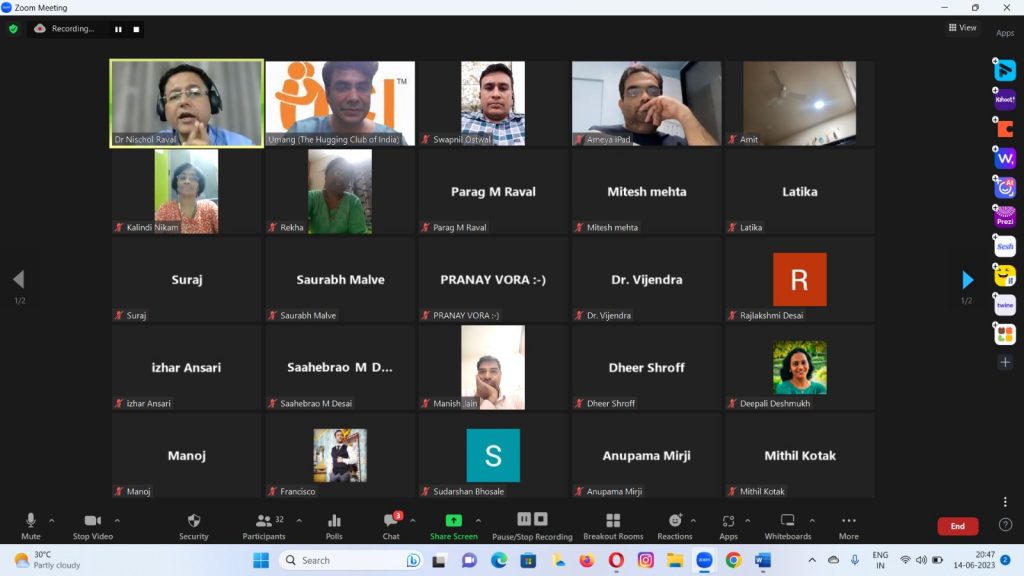Our HCI Online session on June 7, 2023 was on Anxiety. We aimed at understanding it, learning how to deal with it and live with it in a good spirit and in a lighter way. Our esteemed guest for the evening was Dr. Kalpana (Athvale) Raval, a consultant psychiatrist and psychotherapist based in Pune. She is a self-confessed Bollywood buff, which explains the quirky title she chose for the discussion! Anxiety is considered a primary emotion in our mind, which is beneficial to our performance as individuals, provided it is at a medium level. It is actually a helpful emotion that keeps us alert. Without any anxiety, would we study and prepare for exams? Would we rehearse any performance? Would we be able to work without the pressure of a deadline?

The optimum level of anxiety would differ depending on the situation and the individual. A higher level can cause things like being blank before a performance or overthinking. The optimum level of anxiety would differ depending on the situation and the individual. A higher level can cause things like being blank before a performance or overthinking.
Anxiety has several components, e.g. physical symptoms, mental (or cognitive) component, psychological component causing an emotional roller coaster and an autonomic component where our autonomic nervous systems gets disturbed.
There are 3 main criteria that distinguish plain anxiety from an anxiety disorder. It is anxiety disorder if it is:
1. Out of proportion (anxiety response is overwhelming as compared to the situation)
2. Out of context (anxiety symptoms appearing without any apparent reason)
3. Outlasting the situation (anxiety remaining even after the related event has passed, e.g. an exam)
Signs of anxiety disorder may require help from a mental health professional.

Types of anxiety disorders:
1. Panic attacks: a sudden increase in heart beats, trembling, sweating, fears of heart attack/ stroke/ breathlessness or the patient may fear he is losing his mind. He may reach the casualty of a nearby hospital with these fears but the doctor’s diagnosis does not substantiate any such conditions.
2. Generalised anxiety disorder: Dr Kalpana illustrated this condition with a 1979 Bollywood movie “Meri Biwi ki Shaadi” in which the protagonist played by Amol Palekar has this irrational fear entrenched in his mind that he is going to die. Therefore, he prepares to get his wife married off even while he is alive so he can leave this world without any worries. This is a classical example of generalised anxiety disorder. Symptoms are headaches, palpitations, tension, giddiness, restlessness, uneasiness which is lingering. Usual blood tests would be fine indicating no other physical condition.
3. Phobia-specific anxiety: The world of Harry Potter provides perfect examples for phobias. Harry Potter fears Dementor, Neville Longbottom is fearful of his teacher Snape and Ron Weasley is scared of spiders. A person with a phobia is normal except for that specific fear.
4. Social anxiety: People with social anxiety are okay with a limited group of people, but when they are in a large group or when they have to be in a gathering, (e.g. a wedding function or get togethers) they get extremely nervous and make excuses to get out of it.
5. Performance anxiety: It happens when one has to perform at an event or give a lecture or if a student is asked to respond to a question in a classroom or before a viva, etc. There would be butterflies in the stomach at such a time.

Why Anxiety needs to be treated? Anxiety affects our autonomic nervous system, which is a core engine running in our body. It is connected to several organs and therefore persistent anxiety disorder, if left untreated for years, can cause diseases all over the body.
Myths about Medicines: 1. I have to take medicines for lifetime 2. I will get addicted to medicines 3. Medicines will make me drowsy 4. They are ‘strong’ – will have side effects Along with medicines, we also need to practice relaxation techniques, such as progressive muscle relaxation technique. Details of the technique may be obtained from YouTube.

Highlights from the Question & Answer session:
1. Anxiety is causing Procrastination:
Make a list of the tasks and assign priority to them. Start with only the absolutely essential tasks. To motivate yourself, give yourself a star on the calendar if you were able to complete an essential high priority task today that you did not prefer to do initially. Try to get 2 stars daily. If you get 12 or more stars in a week, reward yourself with something you like, e.g. allow yourself an ice cream. Once you master completing these essential tasks consistently, challenge yourself to add additional tasks and give yourself a special reward once you get there.
2. How to deal with insecurities due to anxiety? (for example insecurities related to looks or abilities):
At times of anxiety, go out for a walk or jog at the spot. Physical activity reduces anxiety. Restlessness and the insecurities will automatically settle down. Positive affirmations (self[1]suggestions) also help in such scenarios.
3. Had previous history of addiction and now have anxiety of relapse:
This would be an example of a good anxiety because it keeps one alert of not falling back into old, harmful habits.

4. How to help if someone near you is having a panic attack?:
Person is extremely restless and may not be in a receptive stage. But you can try the following: a. Assure him his condition is not dangerous. b. Offer him a glass of water, make him sit down and simply be with him. c. Maybe you can get him to try relaxation breathing exercise calmly and do it side by side with him (deep slow inhalation, hold and slow exhalation). d. Take him for a gentle stroll, maybe talk random things with him or hum a song. e. Grounding technique: Try to do this together with him. It is a 5,4,3,2,1 technique. – Begin with 5 things that a person can see, maybe a glass of water, a car, a towel hanging on a rack, etc. – 4 things a person can hear, e.g. a TV running in the background, a car horn, people talking, etc. – 3 things a person can feel the touch of – 2 things that a person can smell and – 1 thing that a person can taste Usually by the end of this, the person would have calmed down.
5. How to deal with social anxiety?: For example if you need to attend a wedding, a technique that works here is to rehearse mentally about the kind of situations and people you will face and how you will react. The fear of anxiety will start to lessen gradually This can also be done while doing progressive muscle relaxation technique. Over time when this is practiced regularly, confidence will increase and the feeling of being overwhelmed will dissipate.
It was an enlightening session where we learned a lot about anxiety and are more confident on dealing with it in our day to day lives. Dr. Kalpana’s ever smiling face and calming demeanour is what made the session a one to remember.
– Written by Amit Rai
– Compiled by Amol More
– Edited and uploaded by Mahrukh
